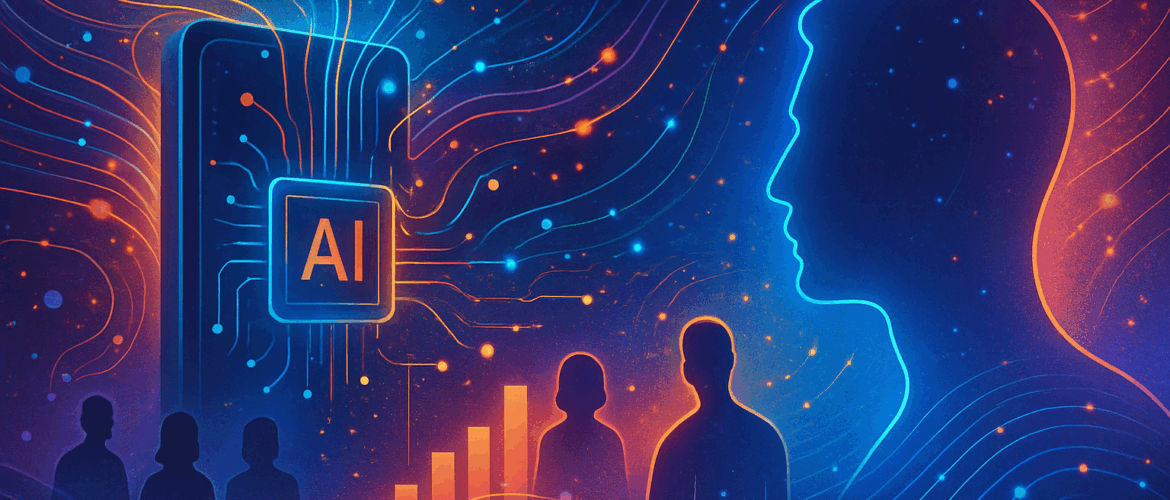Artificial intelligence (AI) has shifted from an experimental side project to a driving force in marketing. Today’s consumers expect personalized experiences, and brands leveraging AI see faster growth and higher customer satisfaction. This guide explores how AI is reshaping marketing in 2025, the opportunities and challenges it presents, and strategies for ethical and effective adoption.
Why AI Matters for Modern Marketing
AI automates repetitive tasks, delivers insights from vast datasets and powers personalized interactions at scale. A Harvard Professional Development analysis notes that marketers use platforms like HubSpot and Mailchimp to automate campaigns, reduce time spent on manual tasks and gain actionable insights. AI’s acceleration has been dramatic: 69 % of marketing professionals are excited about AI’s impact on their jobs, and 56 % of companies are actively implementing AI. Most marketers can’t imagine working without it.
Practical Use Cases
Content optimization and creation:Over half of marketing teams use AI to optimize content such as email copy and blog posts, and 50 % create original content using AI tools. Generative AI can draft scripts, ads, and social posts in seconds.
Personalization: AI-driven algorithms analyze behavior and predict preferences to deliver hyper‑personalized campaigns. In fact, 73 % of marketers say AI plays a role in creating personalized experiences, and 71 % of consumers expect personalized interactions.Brainstorming and ideation: 45 % of marketers use AI to brainstorm content ideas, accelerating the creative process.Automation of tasks: 43 % of marketers automate repetitive processes with AI, freeing teams to focus on strategy.Social media monitoring and insights: About 43 % consider AI essential to their social media strategy.
AI also helps with predictive analytics and lead scoring, enabling marketers to identify high‑value prospects and adjust campaigns in real time. McKinsey research shows that targeted promotions, powered by AI and generative AI, help brands deliver relevant offers that resonate with micro‑communities and drive purchase decisions.
Personalization and Real‑Time Adaptation
Personalization has moved beyond segment‑based email blasts. ON24 predicts that AI‑driven personalization in 2025 will deliver customer experiences that adapt instantly as users interact. Machine learning models analyze patterns to anticipate needs, tailor content and adjust recommendations on the fly. This level of personalization is crucial in an era of digital fatigue—users increasingly ignore generic messages and value relevant, timely interactions.
McKinsey notes that 65 % of customers see targeted promotions as a top reason to make a purchase. Brands that invest in AI‑driven personalization can deliver hyper‑targeted offers across channels—email, in-app notifications and text—while reducing promotional costs.
AI as a Strategic Partner
AI isn’t just automating tasks; it’s becoming a strategic partner. ON24 predicts that marketing teams will increasingly rely on AI for decision‑making, using predictive analytics to identify emerging trends and optimize campaigns. For example, AI can simulate campaign outcomes based on variables like user behavior and search trends, helping marketers allocate budgets efficiently.
As AI matures, marketing departments could evolve into innovation hubs. Deloitte predicts that by 2025, 25 % of enterprises using generative AI will deploy AI agents to enhance workflows. These agents can handle cross‑department collaboration, freeing marketers to focus on creativity and strategic growth.
AI‑Driven Search and SEO
Search behaviors are changing. Zero‑click searches—where answers appear directly on search pages—now account for almost 60 % of queries, and 68 % of U.S. adults use generative AI to answer questions. Marketers must adapt by creating high‑quality content that addresses “how‑to” queries and optimizing for AI‑powered search results. Natural language processing helps search engines deliver contextual results, so focusing on relevance and intent is critical.
Video and Emerging Formats
Video remains a dominant channel, and AI is making video creation more accessible. Wistia’s State of Video Report found that 61 % of companies struggle with time and bandwidth to produce video content, but AI‑powered tools can turn transcripts into short clips and personalize messages at scale. As Andrew Warren‑Payne notes, AI will enable businesses of all sizes to create refined, targeted video content.
AI Tools Spotlight
Harvard DCE highlights several AI tools transforming marketing workflows:
– **ChatGPT:** Builds chatbots, generates personalized email campaigns and helps brainstorm strategies.
– **Copilot for Microsoft 365:** Drafts marketing plans, blogs and social posts.
– **Gemini for Google Workspace:** Summarizes information and automates tasks.
– **Jasper AI:** Generates content and analyzes data.
– **HubSpot’s AI tools:** Manage ad campaigns, personalize content and track performance.
– **Synthesia:** Creates personalized video content.
These tools streamline tasks and allow marketers to scale campaigns quickly. However, experts warn against over‑reliance; human creativity and oversight remain essential.
## Challenges and Ethical Considerations
### Barriers to Adoption
Despite excitement, AI adoption remains uneven. SurveyMonkey reports that 44 % of companies are waiting for more established solutions. Barriers include a lack of training, strategy and resources. About 39 % of marketers are unsure how to safely use generative AI, and 43 % don’t know how to get the most value from it. Notably, 70 % report that their employers don’t offer AI training.
### Ethics and Trust
Ethical issues such as data privacy, bias and transparency are top concerns. Harvard DCE emphasizes the risk of misuse—deepfakes, copyright infringement and over‑automation—and stresses the need for clear policies. Christina Inge reminds marketers that AI won’t replace jobs; rather, those who understand AI will replace those who don’t. Building consumer trust also requires transparency about AI usage and balancing automation with human interaction—especially since 90 % of consumers prefer speaking with a human representative over a chatbot.
## Recommendations for Marketers
1. **Invest in education and training:** Develop AI literacy across your team. Platforms like HubSpot and Coursera offer courses to build foundational skills. Train staff to leverage AI ethically and responsibly.
2. **Prioritize data quality and governance:** Accurate personalization relies on clean, well‑governed data. Ensure compliance with privacy regulations and adopt frameworks to mitigate bias.
3. **Use AI to augment, not replace, human creativity:** AI excels at analysis, automation and content generation, but human insights are crucial for strategy and brand voice. Foster collaboration between humans and AI.
4. **Start with clear objectives:** Identify specific pain points—whether it’s content creation, segmentation or lead scoring—and choose tools that align with your goals. Begin with pilot projects and scale gradually.
5. **Experiment and iterate:** Use predictive analytics to test campaigns, measure results and refine strategies. AI allows for rapid experimentation, enabling marketers to adapt to trends quickly.
## Looking Ahead
AI’s role in marketing will continue to expand. Generative AI is expected to generate 30 % of outgoing marketing messages from large companies by 2025, and AI agents may handle complex workflows across departments. Meanwhile, consumers’ expectations for personalization will only grow; 76 % become frustrated when companies don’t deliver personalized experiences. To stay competitive, marketers must embrace AI thoughtfully—balancing innovation with ethics, and human creativity with machine intelligence.
By investing in the right tools, developing skills and fostering ethical practices, businesses can harness AI to build deeper customer connections, drive growth and create marketing that feels personal and relevant in 2025 and beyond.




